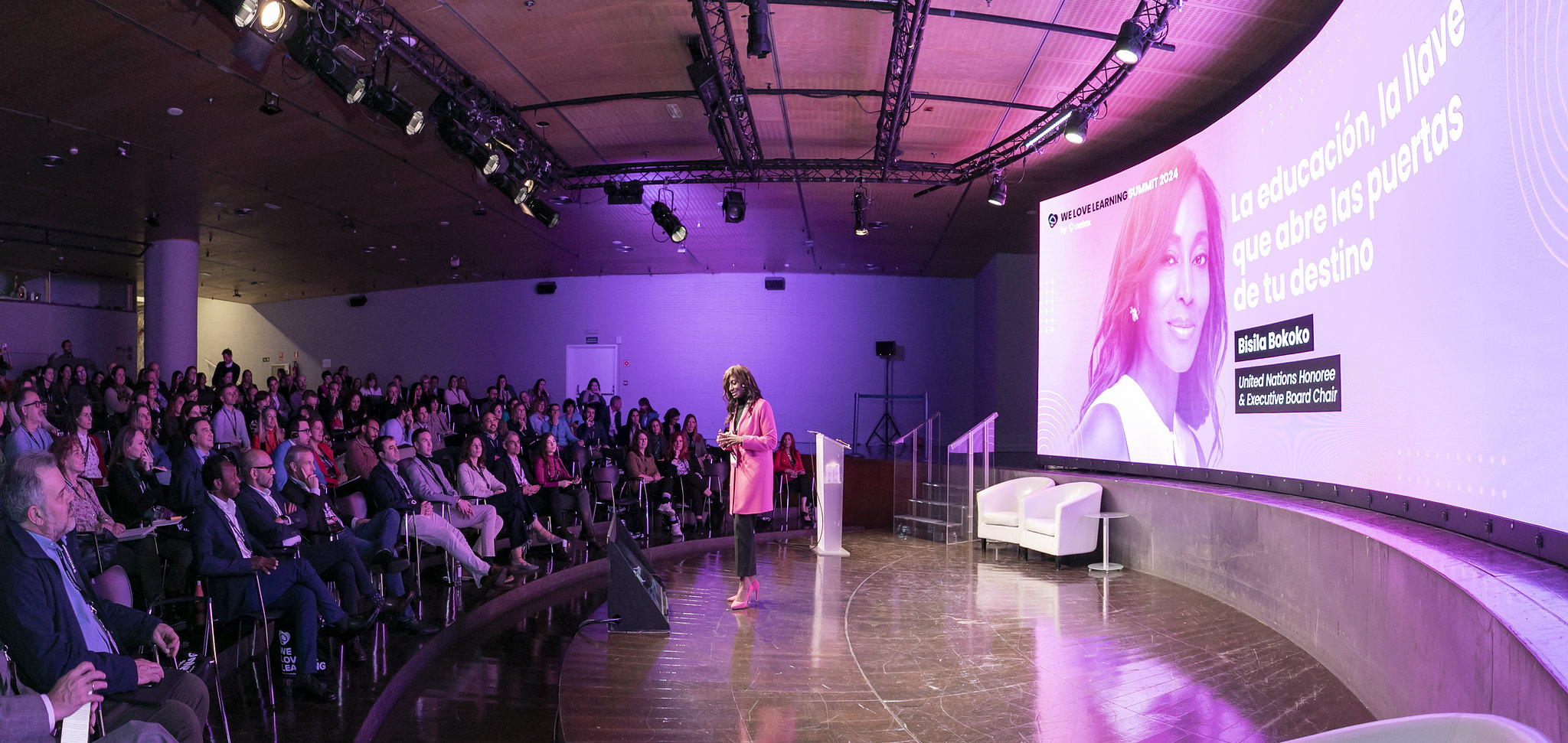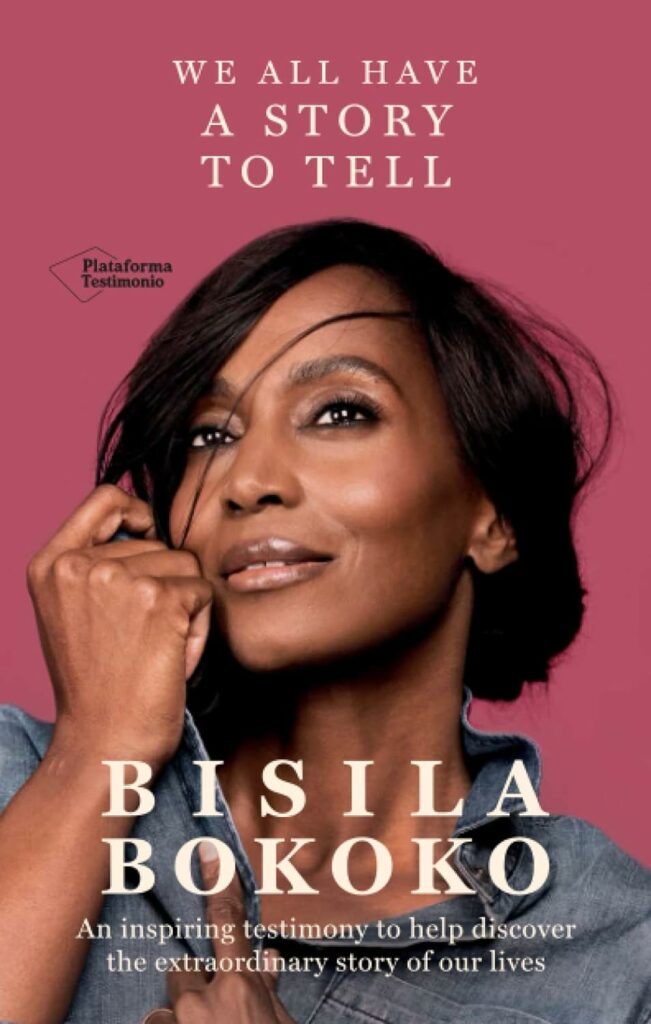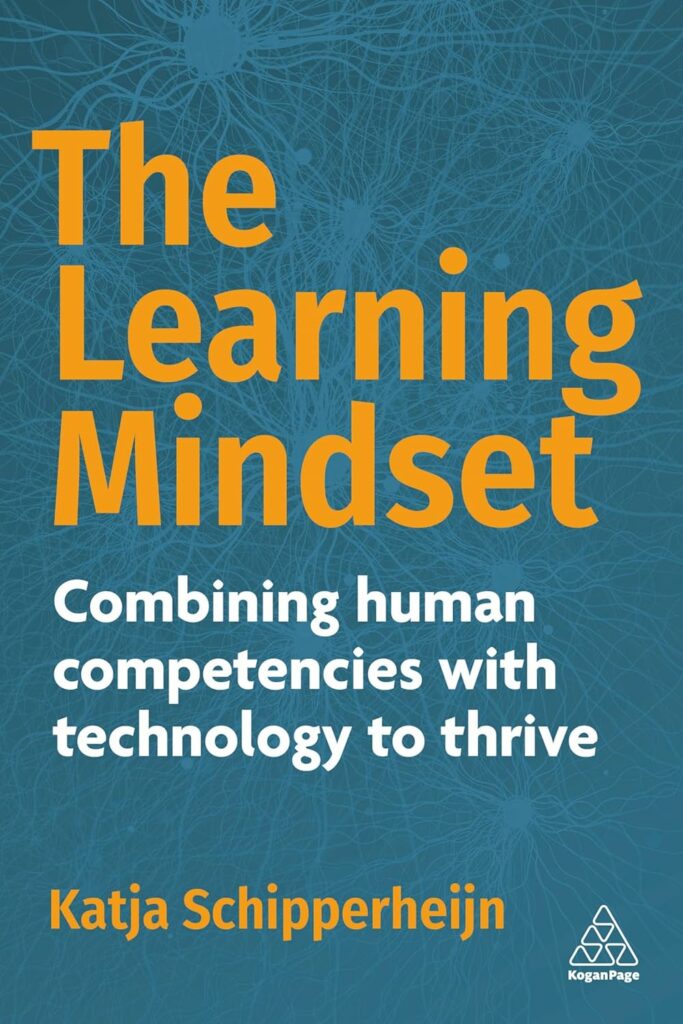Share
We can choose to be hindered by our past or use it as a source of strength to enable us to rise above our expectations.
Bisila Bokoko, United Nations Honouree & Executive Chair, shared this wise lesson with the audience at We Love Learning 2024 in Madrid. Bisila and I share the beliefs that everyone can learn from failure, and that when we learn together, we can all thrive despite the obstacles and fears that can get in the way of our learning mindset.
I was honoured to have a conversation with her for my new book, The Learning Mindset, about her story, one which will inspire us to move forward in the story of our own lives. It is a story about choosing whether you want to be that little ripple that impacts the infinite learning ecosystem and help build a better future for all.
A learning influencer who draws strength from failure
Bisila Bokoko believes that we are primarily responsible for our own future. She learned this wise lesson from her great-grandmother, who escaped domestic violence by embracing learning and seeing it as the key to leading her own life. She proudly bore her nickname, Señorita Escuela [Miss School], after not only taking control of her own life, but also passing on her love of learning to others by starting her own school.
When it came to her own learning, although Bisila was initially driven by fear of failure, she gradually learned that failure was just a step toward becoming better. Learning can be fun and is a way of life we should share with others as much as possible. So, I fully agree with her that everyone is a learning influencer and that failure can be just that extra incentive.
We are all born with a learning mindset; it is part of being human, but we need to keep that light bulb actively lit to be able to constantly improve. Regardless of the diversity we are born with, every human being has the ability to keep that light bulb burning within themselves. But it is the responsibility of everyone in the learning ecosystem to contribute to that and not just the responsibility of the education system, which today is not democratic and does not offer us equal ways to discover our learning mindset. Indeed, education alone does not provide the opportunities to nurture our learning mindset for the rest of our lives.

When Bisila realized she could light that lamp herself, she changed her belief system. Through falling down and getting up again, she discovered that we need to find learning within ourselves and take ownership of it. For this, we need to let go of fear and a simple way we can do that is by smiling. I learnt from Bisila that, for example, smiling at yourself every morning can help remind you of the relationship you have with yourself.
You shouldn’t let anyone else have power over you by telling you what you can do, what you need to learn or that you are not good enough because if you do, your smile will be taken away from you. Instead, let go of that fear and let go of letting other people have power over your life. How other people see you is up to them, the important question is: how do you see yourself? You need to give yourself love and positivity, not criticism and judgement. If you can do that to yourself, you can do the same to others. So, it all starts with you… but can you accept yourself?
Through self-acceptance, you can overcome self-doubt and even imposter syndrome. To do this, you have to stop comparing yourself to others. Trust that what you admire in others is also in you, and make a promise with yourself that you’ll find it and let it blossom. Don’t settle too soon by convincing yourself that you cannot achieve your dreams. Don’t focus on what is not perfect in yourself, because by doing that you create a self-fulfilling prophecy and it becomes the truth. So, change your story by looking at what you want to achieve and make that your story instead.
Technology to support social and collaborative learning
In today’s world, when it comes to learning, technology can be an equalizer. Not just for ourselves as individuals, but it also allows us to learn and grow with others. Technology that can connect us through social and collaborative learning. Technology which links us to inspiring learning influencers who share their stories, successes and failures from which we can learn valuable lessons.

Bisila also sees learning technology as being able to add value to the many people in the world who cannot adapt to a system where they have to sit in classrooms to learn because they do not have the learning resources. Here, she stresses the importance of the United Nations Sustainable Development Goals (SDGs), especially SDG 4, which is Quality Education, because everyone has the right to access education and knowledge at all times. Because education can be a positive weapon for equal rights. Just think of the many girls in Africa and other regions who do not have the right to go to school when they are menstruating.
Personally, I also see learning technologies as increasingly becoming an equalizer because it makes learning accessible to all. Integrating different applications can answer the challenges for neurodiverse learners. This means that content and learning channels can be adapted so that dyslexia and ADHD are no longer obstacles to learning. For me, this is where learning ecosystems add absolute value. They make learning social again and put humanity, inclusion and connection first.
Leadership and an infinite learning ecosystem
Learning leaders know the added value of connected learning ecosystems, recognizing they help engage employees and support their learning mindset. However, today, leaders must also dare to look outwards and recognize that they can also have an impact on society beyond the boundaries of their own organizations. Leaders who make a difference do more than just share their values on websites or claim to support the United SDGs, they take action because education, health and the economy are everybody’s responsibility. Bisila has also seen this when she has mentored top executives and CEOs.
Unfortunately, in many cases, learning, both for their own employees and others outside their organizations, is at the bottom of the leader’s priority list. So, regrettably, we are finding that leaders – and this includes government leaders too – are not making learning a top priority. They are also often failing to recognize that new technologies and a connected ecosystem for learning have important value to offer. If we do not have an educated population that embraces the mindset of learning, we will kill ourselves instead of developing as a society.
It is leaders everywhere who must lead by example and show young people and all generations that learning can be a powerful, positive weapon and a catalyst to achieve many more of the SDGs.
As a learning leader, your mission should be to make people better, not just for the company but for everyone’s future. A mission that supports the learning mindset of everyone in the infinite learning ecosystem and gives them the wings to fly ever higher. This is what makes learning leaders unique, they rejoice when other people flourish and see it as the ultimate form of success.
Who is Bisila Bokoko?
Bisila Bokoko is a multi-award-winning entrepreneur, speaker on global leadership and author of We All Have a Story to Tell. If one word could sum up everything Bisila Bokoko conveys, it would be “inspiration”. Her personal story is one of a woman of race who has learned to grow despite setbacks; her business, her wisdom, her love of books and her philanthropic spirit are an example to many.


Who is Katja Schipperheijn
Katja Schipperheijn is an internationally recognized learning strategist and founder of Habit of Improvement, a consultancy that focuses on learning strategies that foster growth and well-being in a human-machine symbiosis. Besides her work in corporate settings, she is founder of the sCooledu foundation with which she reached over 15,000 children participating in her workshops on digital citizenship. She is also an international keynote speaker, guest lecturer and the author of The Learning Mindset and Learning Ecosystems, published by Kogan Page.
Share

